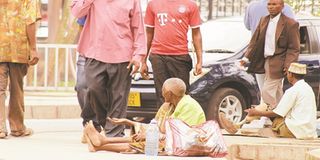Why beggars flock to Mwanza city

Most of the vagrants on different streets of Mwanza are aged 55 years and above and a few are children.
What you need to know:
Mwanza, unlike other cities in Tanzania, receives a huge number of newcomers who are either in search for jobs or with unknown missions.
Mwanza. While there are beggars in virtually in all parts of the country, this city might soon become a leading home to this segment of Tanzanian society, if our observations are anything to go by.
“Nisaidie, naomba, naomba, ubarikiwe baba, Mungu akuongezee”(Help, help, be blessed, God will reward you).
These are common echoes heard in Mwanza city corners.
A quick survey by The Citizen around Nyerere Road, Uhuru streets in Mwanza revealed a high concentration of beggars who have accepted begging as their mode of earning a living.
Mwanza, unlike other cities in Tanzania, receives a huge number of newcomers who are either in search for jobs or with unknown missions.
Most of the vagrants on different streets of Mwanza are aged 55 years and above and a few are children.
For instance, Liberty Street, one of the biggest and congested lanes in the city centre is normally inundated by beggars hanging their hands and small vessels up asking for offerings.
Tens of beggars interviewed by The Citizen revealed that, Mwanza is a better place to stay because life is cheap. They said that food is plenty and rentals bills are affordable.
“If one cannot survive in Mwanza they may not lead any life style in Tanzania.
There is almost everything here and people are very generous compared to other places.” One of the beggars at Bantu Street said.
Ms Pendo Madereke, 68, is one of the well-known beggars in Mwanza. She said she started to traverse the city asking for help after her husband died some years ago.
“I come from Kabange Village, Butiama District in Mara Region. I gave this career a test in Musoma Town but no one seemed to care about my destitution. I came to Mwanza after being briefed by a colleague that the city had sympathetic people.” Said Ms Madereke.
She claims to have been collecting almost Sh5, 000 a day. She said when the day goes well she collects Sh10, 000.
The mother of three spends the all-day fighting to earn a living.
“I have a boy in secondary school and another one will be enrolled next year. They were delayed for studies because in the past we had no hope for the future.” She said
Rufiji Street is also full of beggars but they are not as many as the ones in the Bantu Street.
Kibesa Mutalinga is an elderly man who has camped at Rufiji Street for many years now. He says, he can collect between Sh5,000 to 10,000 per day depending on circumstances.
“I didn't wish to come to Mwanza for begging but was forced by destitution. I cannot do any manual work. I would have tried other jobs rather than getting sunburns throughout the day and end up with these few coins.” Said Mr Kibesa.
The crippled man crawled from one pavement of busy Rufiji road to the other to buy a ‘Dasani’ drinking water.
Pamba councillor, Samwel Range, says his ward has many beggars but sometimes their number goes up and down, especially on Mohamed Street which is among big and busy Streets along Bugando Hospital.
“Most of the beggars have made begging their key source of income. They come from as far as Usagara, Kisesa and Magu wards,” Mr Range said.
The councilor added that, many parents and guardians were to be blamed for sending their children to loiter on streets.
These are the newest breed of beggars. They are not shabby looking or haggard in appearance. Some of them wear very expensive clothes.
He added that they are a group of people who narrate to you stories of how their wallets were stolen or had run out of cash and were stranded in a particular location with no cash for transport.
He noted that some beggars claim to be unfortunate tourist looking for funds to get on with their journey.
“If the amount you offer them is not up to their expectations, they get on with repeating their story, really emphasizing on the sad nuances of that tale, coaxing you to give them more money,” he said.
According to one of the welfare officers in Mwanza who didn't want to mention his name for fear of reprisal said Mwanza receives a huge number of vagrants but not all of them belong to the same status.
The child on the street that runs after you, tugging at your clothing, asking for handouts or financial assistance is a beggar as well.
He said usually their parents sit not too far keeping a watchful eye waiting for children to bring fortune. It is hard to ignore these children as their styles of begging have a way of appealing to almost all kinds of people.
It is best to give this kind of beggar food or clothing rather than cash because the money one gives them has been benefiting their parents.


